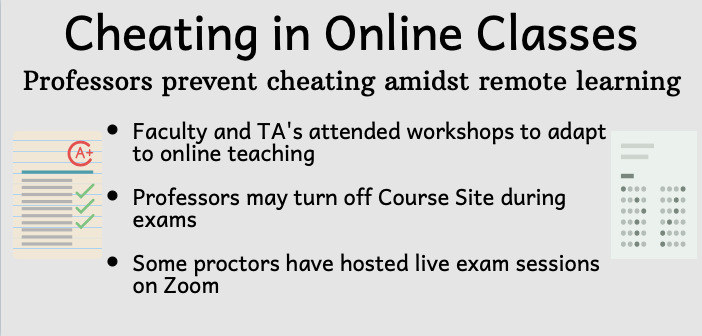As Lehigh navigates through the many transitions involved in online learning, faculty and staff have debated how to handle online exams while maintaining academic integrity in the classroom.
Greg Reihman, vice provost for Library and Technology Services and director of Lehigh’s Center for Innovation in Teaching and Learning, said he worked to help faculty and staff transition to online learning.
Reihman said some schools are using a third-party remote proctoring service such as ProctorU, however, Lehigh’s senior leadership did not want students to be charged additional fees as a result of the move to online learning. They were also not convinced it was the best approach to promoting academic integrity in online testing.
Reihman said his team offered alternative approaches for faculty to increase academic integrity in online learning.
“Most (faculty) feel confident that the assessment practices they have in place will maintain the rigor of their courses while responsibly promoting academic integrity,” he said.
Reihman said the majority of the faculty who needed to come up with new solutions were those who teach large classes and rely on common hour and final exams.
He said he has heard these faculty members are coming up with approaches that will minimize student temptation to cheat and make it more difficult for those who attempt to do so.
Holly Taylor, assistant dean and director of Student Life, said she does not think the numbers of students cheating will dramatically increase or decrease due to the move to remote learning.
She said there are expectations that Lehigh students will continue to follow the rules as if they were on campus.
Taylor said that professors have the ability to track if their students are on CourseSite and she has already received a case about students allegedly logging into CourseSite during an exam. She said this is something she sees during normal semesters, too.
Taylor said that one way for professors to reduce cheating is to turn off Course Site during exams. Professors may post lecture slides or other learning materials on the platform during the normal course of a semester.
“I also have heard professors say, ‘I purposely leave it on because I want my students to know I am looking at that during the exam’,” Taylor said.
The Office of Student Conduct will continue to resolve any cases brought to them concerning Zoom.
Taylor said the Conduct Office remains active despite the closure of campus. She said hearings and processes will be relatively normal.
Jake Levine, ’20, a biology major, said he was assigned a take-home, open-note test that would have normally been given in class.
“I felt like the test was fair,” Levine said. “Because the information on the test was so reliant on the class lectures, it would have been difficult for students to cheat. I think students should take this time to do what is right for their academics. It’s more important to learn the material than get a good grade.”
Todd Watkins, a professor of economics and the executive director of the Martindale Center for the Study of Private Enterprise, said he adjusted some of his classroom plans for online learning.
In a seminar-based class, ECO 203, Watkins said since his exams are essay-based, cheating was not a big concern. As a result, the alterations he made were to make the test timed, make the test longer and turn the test in on Turnitin.com.
“It’s not like we aren’t aware cheating happens, and we do try to mitigate it somehow,” Watkins said. “It’s imperfect, no question about it. It’s an imperfect moment at Lehigh and for all college students right now, so we are trying to make it work as best as we can.”
Watkins said his colleagues in economics have been spending time talking about how to organize their courses.
He said some colleagues, especially those teaching classes with quantitative material, are contemplating randomized questions or randomized numbers within questions while others are contemplating having students share videos of them taking exams.
Watkins said his ECO 333 and ECO 402 classes involve more problem sets. For these courses, he said he plans to include calculation problems in addition to requiring write-ups where students assess results and make recommendations.
“I think it will play to different strengths,” Watkins said. “Students who would’ve done particularly well on a highly quantitative exam might be disadvantaged a bit.”
While the faculty and staff can do their part in mitigating cheating, students also have a responsibility.
Watkins said while cheating has always been a concern, he hopes most students are sensible enough to not cheat and respect that they are here to learn.
Reihman added no system is 100 percent effective at preventing plagiarism or cheating. He said the professors have a responsibility to put effective measures in place, and students have the responsibility to maintain academic integrity and make good choices.






Comment policy
Comments posted to The Brown and White website are reviewed by a moderator before being approved. Incendiary speech or harassing language, including comments targeted at individuals, may be deemed unacceptable and not published. Spam and other soliciting will also be declined.
The Brown and White also reserves the right to not publish entirely anonymous comments.